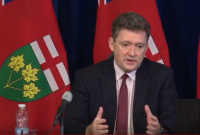Support strong Canadian climate journalism for 2025
A new policy that has pharmacists restricting patients to a 30-day supply of their medications means some people are having to pay dispensing fees two or three times over.
The policy was put in place to prevent drug shortages while manufacturers struggle to produce enough product during the COVID-19 crisis.
But that means patients who would normally receive 90-days' worth of prescription medications are now paying the dispensing fee three times instead of one in some provinces.
"All of a sudden they're going to see their cost for prescriptions go up 200 per cent," said Kathleen Finlay, the founder of the Center for Patient Protection.
In most places, those dispensing fees are between $5 and $15. But some people have multiple prescriptions, multiplying the cost, she said.
"It gets up there really quickly," she said.
She's particularly concerned about fixed income seniors, who are being hit with these costs out of the blue. She said some people may be faced with tough decisions about whether they can afford to renew their prescriptions when they need them.
Some provinces, like Alberta, have adjusted their co-pay structure for seniors and those without private insurance to offset those costs, but not all.
In British Columbia, the province covers dispensing fees for many people with low incomes or high medication costs under a complex pharmacare plan.
But even there, some people are going to feel the impact of the new 30-day supply rules when they go to renew their prescriptions next month, according to the seniors' advocate for the province.
"It’s going to potentially make things quite tight for them," said Isobel Mackenzie.
She and her counterparts in other provinces have raised the issue with the provincial and federal governments and urged them to cover the additional costs.
The Canadian Pharmacists Association, which recommended the restrictions, has been hearing from patients concerned they will have to pay more.
"We knew that was a risk," said spokesperson Barry Power, adding people may not be able to get their medications at all if nothing is done.
"We felt that avoiding drug shortages was the better way to go."
The association has been working with governments and insurers to address the added burden on patients, he said.
"This is the cost of safeguarding Canada’s drug supply and it should be borne by Canada as a whole, not small businesses," Power said.
Canada is already starting to see medications fall into short supply as a result of COVID-19, he said.
According to Health Canada, there are supply constraints for certain drugs like sedatives, pain relievers, and muscle relaxants.
While individual pharmacies have the discretion to waive dispensing fees if they want to, the money goes a long way to covering the pharmacy's costs, Power said
With every prescription, the pharmacist must verify the medication and proper dose, make sure there are no adverse drug interactions, and make sure there is enough inventory, he said.
The fees also help pay for the added expenses pharmacies have borne to stay open during the pandemic. Many have installed barriers between patients and customers and hand-sanitizing stations, for example.
He said it's important that pharmacists doing essential work are not made to cover those costs themselves, just as the government wouldn't ask nurses or doctors to pay for their own protective equipment in a hospital.
But if provinces don't act, he said the costs will trickle down to patients instead.
This report by The Canadian Press was first published April 3, 2020.





Comments
For many seniors like myself, I do take multiple meds. However for over 20 years now, I have split pills where possible. Capsules you cannot split, but tablets can usually be split. Why? How? I actually asked my pharmacist in the 1990s, what his fees were. I also also asked what is the cost of 40 mg tab vs 20 mg tab vs 10 mg tab. Surprised that a 10mg or 20mg costs the same or darn close to it as a 40mg. So if my dose was 20mg i purchase 40s then break them . Requires co-operation from your Dr. to prescribe it as half or even a 1/4 . Cuts your cost significantly and have never had a problem in 20+ years
There should be no reason at all that the drug suppliers, who've been unable to meet production demand, shouldn't support the pharmacists, who apparently are the ones calling for the measure.
There should be no reason at all why doctors need to change their prescribing mode ... and by extension, no reason at all why pharmacists need to do anything at all monthly other than counting the same number of pills they'd have counted before, only in lesser quantities.
I've experienced a short supply of analgesics prescribed after surgery: the pharmacy noted both on the label and on their documents that what I got was a partial prescription, and didn't charge an extra dispensing fee. In fact, they delivered the prescription to my home (which several pharmacies will do, as well as waiving the co-pay part of the dispensing fee).
Personally, I don't undersand why the least able to pay should be asked at all to make sure that pharmacies don't "pitch in" their "fair share" of the financial "pain" we are all going through and being expected to absorb not only for ourselves but for others. Enough is enough a'ready.